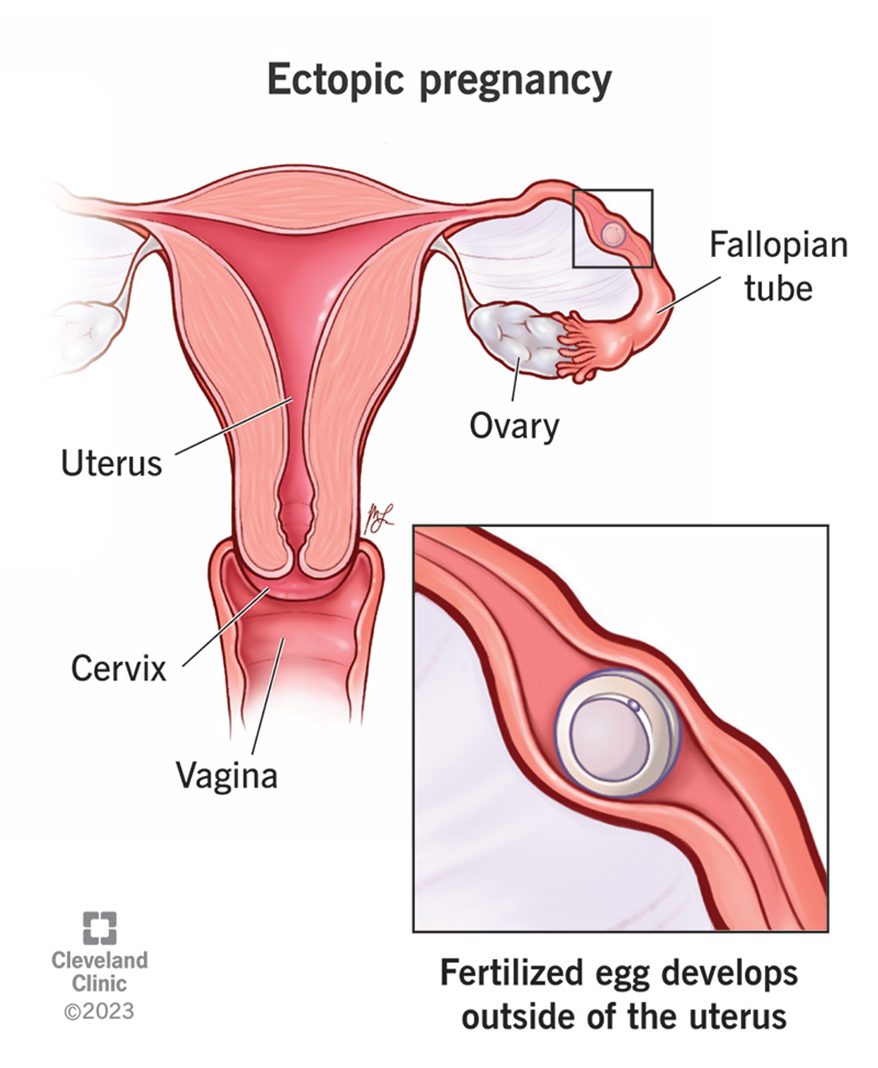A nurse is caring for a client who has a suspected ectopic pregnancy at 8 weeks of gestation. Which of the following manifestations should the nurse expect to identify as consistent with the diagnosis?
Large amount of vaginal bleeding
Uterine enlargement greater than expected for gestational age
Severe nausea and vomiting
Unilateral, cramp-like abdominal pain
The Correct Answer is D
Choice A reason:
A large amount of vaginal bleeding is not typically associated with an ectopic pregnancy. While some vaginal bleeding can occur, it is usually light and not the primary symptom. Heavy bleeding is more commonly associated with other complications such as miscarriage or placental issues.
Choice B reason:
Uterine enlargement greater than expected for gestational age is not a characteristic of ectopic pregnancy. In fact, the uterus may not enlarge significantly because the pregnancy is occurring outside the uterine cavity. This symptom is more indicative of conditions like molar pregnancy.
Choice C reason:
Severe nausea and vomiting are common symptoms of a normal pregnancy due to hormonal changes but are not specific to ectopic pregnancy. While some women with ectopic pregnancies may experience nausea and vomiting, these symptoms alone are not diagnostic.
Choice D reason:
Unilateral, cramp-like abdominal pain is a hallmark symptom of ectopic pregnancy. This pain typically occurs on one side of the abdomen, corresponding to the location of the ectopic implantation, usually in a fallopian tube. The pain can become severe and is often accompanied by light vaginal bleeding. If the fallopian tube ruptures, the pain can become intense and may be accompanied by signs of internal bleeding, such as dizziness, shoulder pain, and shock.

Nursing Test Bank
Naxlex Comprehensive Predictor Exams
Related Questions
Correct Answer is A
Explanation
Choice A reason:
Observing for meconium in respiratory secretions is crucial for newborns who are small for gestational age (SGA). Meconium aspiration syndrome (MAS) is a significant risk for these infants. Meconium, the first stool of an infant, can be passed into the amniotic fluid before or during labor, especially in cases of fetal distress. If the newborn inhales this meconium-stained fluid, it can lead to severe respiratory issues, including airway obstruction, inflammation, and infection. Therefore, careful monitoring and immediate intervention are necessary to prevent complications associated with MAS.
Choice B reason:
Monitoring for hyperthermia is not typically a primary concern for SGA infants. These infants are more prone to hypothermia due to their lower body fat and reduced ability to regulate body temperature. While maintaining a stable temperature is essential, the risk of hyperthermia is less common compared to hypothermia. Therefore, this intervention is not as critical as others for SGA infants.
Choice C reason:
Identifying manifestations of anemia is important but not the most immediate concern for SGA infants. Anemia can occur in these infants due to various factors, including intrauterine growth restriction and maternal conditions. However, the immediate postnatal period requires more urgent interventions, such as monitoring for respiratory distress and hypoglycemia. Anemia can be assessed and managed as part of the ongoing care plan.
Choice D reason:
Monitoring for hyperglycemia is not a primary concern for SGA infants. In fact, these infants are at a higher risk of hypoglycemia due to their limited glycogen stores and increased metabolic demands. Hypoglycemia can lead to serious complications, including neurological damage if not promptly addressed. Therefore, monitoring blood glucose levels and ensuring adequate nutrition are critical interventions for SGA infants.
Correct Answer is B
Explanation
The correct answer is b) “We do routine hearing screenings on newborns. You’ll know the results before you leave the hospital.”
Choice A reason:
The statement “There is no need to worry about that. Most forms of hearing loss are not inherited” is not entirely accurate. While it is true that not all forms of hearing loss are inherited, genetic factors can play a significant role in hearing loss. Approximately 50-60% of hearing loss in infants is due to genetic causes. Therefore, dismissing the concern without proper screening is not advisable.
Choice B reason:
Routine hearing screenings are conducted on newborns to detect any hearing issues early. These screenings are typically performed before the baby leaves the hospital. The two main types of newborn hearing screenings are Otoacoustic Emissions (OAEs) and Automated Auditory Brainstem Response (AABR). These tests are safe, painless, and can identify hearing loss early, allowing for timely intervention. Early detection is crucial for the development of speech, language, and social skills.
Choice C reason:
Clapping hands loudly to see if the baby startles is not a reliable method to determine hearing ability. While a startle response might indicate that the baby can hear, it does not provide comprehensive information about the baby’s hearing capabilities. Newborn hearing screenings are more accurate and can detect even mild hearing loss.
Choice D reason:
Observing how the baby looks at you when you speak is also not a reliable method to assess hearing. Babies can respond to visual cues and vibrations, which might give the impression that they can hear. However, this method does not provide a definitive assessment of the baby’s hearing ability. Professional hearing screenings are necessary to accurately determine hearing status.
Whether you are a student looking to ace your exams or a practicing nurse seeking to enhance your expertise , our nursing education contents will empower you with the confidence and competence to make a difference in the lives of patients and become a respected leader in the healthcare field.
Visit Naxlex, invest in your future and unlock endless possibilities with our unparalleled nursing education contents today
Report Wrong Answer on the Current Question
Do you disagree with the answer? If yes, what is your expected answer? Explain.
Kindly be descriptive with the issue you are facing.
